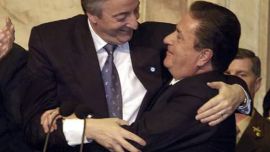Last week’s shooting of a wealthy British father and step-son duo visiting Buenos Aires has resurfaced concerns about crime, especially against tourists, in Argentina’s capital city.
Matthew Charles Gibbard, 50, was shot and killed at around 11am in front of the five-star Faena hotel in Puerto Madero, one of Buenos Aires’ more wellto-do neighbourhoods, after two men on a motorcycle tried to rob him and he resisted, video footage shows. Gibbard’s stepson, Stefan Zone, 28, sustained a gunshot injury to the thigh in the struggle, though he’s now in a stable condition.
The working theory, according to local police, is that the two were picked out and tailed by the assailants when they arrived at Ezeiza International Airport. Authorities believe they were identified as wealthy — Gibbard was a director at Tingdene, a lucrative holiday retirement homes firm in the United Kingdom — and then tracked from the airport to the hotel.
Police, in total, have made nine arrests and on Friday transported the suspected murderer, Ángel Eduardo Lozano Azuaje, alias “Cachete”, to the capital from Salta, to bring him before the courts.
But the attack on Gibbard and Zone isn’t an aberration, seemingly. In January, a Canadian tourist was assaulted and stabbed in San Telmo, just blocks away from where a Swedish tourist was shot a few days before. Tourist review boards are regularly filled with “warnings” about robberies in areas like La Boca and Microcentro.
REPUTATION
Argentina is traditionally considered a safe country, especially in comparison to some of its neighbours that have a historical — though perhaps exaggerated — reputation for crime like Brazil, Colombia and Mexico. But as the economic crisis has deepened in the country, some report anecdotally that the level of petty and, at times, violent crime on the street has gotten worse as well.
In 2017, Argentina had the highest rate of robbery in all of South America, according to the Citizen Security Observatory (OSC). Last year, Buenos Aires and its surrounding areas, where most tourists often travel, experienced an exceptionally high level of robbery relative to the national average, a 147 percent increase.
However, a spokesperson from the Buenos Aires City Justice and Security Ministry said the first 11 months of 2019 had seen a “significant” decline in citywide crime compared to the same period in 2018, citing a 54 percent decrease in robberies by ‘motochorros’ and the City’s first year in the last 24 with less than 5,000 monthly cases of reported robbery.
Motorbike crime – in which gangs target easy to rob items such as mobile phones and bags – had been a huge problem for the City, the spokesperson said, until the police force began specific operations and incrementally increased coverage where such robberies were frequently reported.
Given near-double digit rates of unemployment and poverty levels soaring to close to 40 percent, according to the most recent data, some fear robbery could still be seen as a way to meet short-term needs. Tourists, more likely to carry valuables or cash in dollars, are easy targets.
RESPONSE
Aware of this reality, the Buenos Aires City Police created a “Division of Touristic Corridors,” the spokesperson said, whose function is to cover areas heavily visited by tourists with agents specially trained to provide protection and assistance to visitors. They speak a variety of languages and are there to “prioritise the difficulties that face a foreigner visiting a new country, like not knowing the language, the laws, the environment and cultural diversities,” the spokesperson said.
These officers are found in La Boca, San Telmo, Microcentro and Recoleta.
“The goal of this initiative is to transmit tranquility and satisfaction to visitors, trying to spread the message that assists with the growth of tourism in the city,” the spokesperson added in a statement.
During his presidency, Mauricio Macri avidly backed law enforcement, sometimes amid criticism from human rights groups, who accused him of supporting the use of excessive force and creating a culture of impunity for members of the security forces. The former president instituted measures that gave police more freedom to deploy their weapons, upped the presence of street patrol and even received Luis Chocobar – an officer who controversially shot a fleeing robber who had stolen items from a US tourist – at the Casa Rosada.
Alberto Fernández, during his campaign, made a pointed effort to exploit this vulnerability, saying in his inauguration speech that justice could be achieved “without having to shoot one another in the back,” a direct reference to the Chocobar case.
However, the image of Argentina and, more specifically, Buenos Aires as a place that’s unsafe for tourists could lessen the nation’s appeal for visitors looking to spend money in a struggling economy. Meanwhile, a too-harshon-crime approach to the issue could complicate the promises he made to many voters.
“We should be severe, we can’t
tolerate that,” Fernández said referencing Gibbard’s death. “We
have to find those responsible and
make sure they pay with the rigour of the Judiciary.”
related news



















Comments